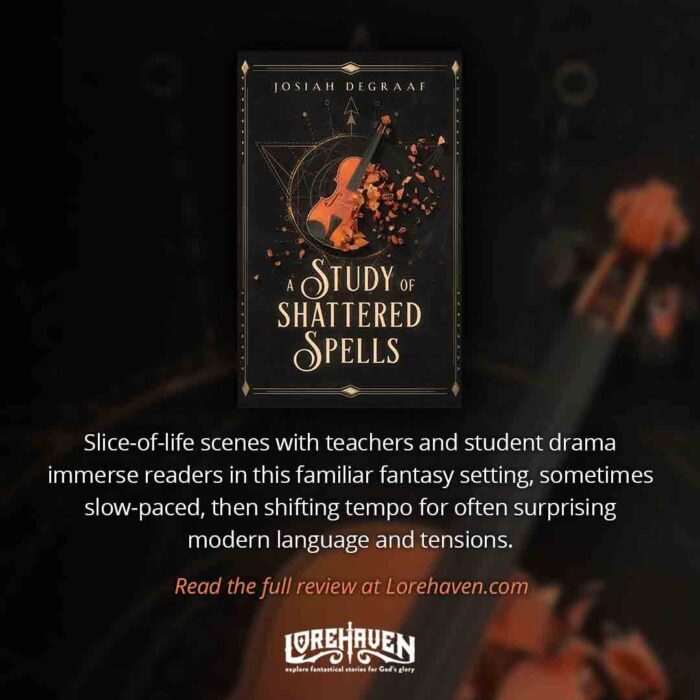How Do We Discern Good and Bad ‘Magic’?
Magic. We often throw around this elusive and ambiguous word. But what is magic? Doesn’t the Bible speak ill of magic?
Christians often are divided and confused about this topic. Theologically grounded parents puzzle over their children’s books, wondering if they’re making the wrong choice by allowing them to read fantasy.
C. S. Lewis’s Christlike hero, Aslan, can help us challenge our suspicion of fictional magic. When Lewis writes of Aslan’s magic, Lewis means this as a literary device. He reveals something about reality through unreality. In the Chronicles of Narnia stories, both good and evil are represented with magic. This is a broad umbrella term for both evil magic and the miracles performed by Christ and his disciples.
Of course, the Bible doesn’t use the word magic in this way. But literature has defined magic differently. In fairy tales, anything supernatural—including miracles—is considered magic. That may cause you to cringe, but Lewis is simply using the word in the same way it’s used in such stories.
So if the good miracles performed in Scripture fall into a “magical” category, according to literary standards, how do we explore modern fantasy novels without being drawn toward the occult? After all, there exists fictional magic (which is not real, but sheds light on reality), and also God’s “magic” known to us as miracles, and also real and evil magic that is used to deceive and wrongly empower humans. How can we tell the differences when they all have the same label of magic?
We will find the answer not so much in the magic system, but a heart system.
Take a closer look at a few mentions of magic in the Bible. We will find a common motivation in the hearts of those involved.
For example, Acts 8:9 reads, “But there was a man named Simon, who had previously practiced magic . . . saying that he himself was somebody great.”
1 Samuel 28 tells how Saul sought a medium to help him speak to Samuel’s spirit. When Samuel asked why he was disturbed, Saul said “God has turned away from me and answers me no more, either by prophets or by dreams. Therefore I have summoned you to tell me what I shall do” (1 Samuel 28:15).
In the book of Exodus, Pharaoh’s magicians (under Pharaoh’s authority) copied Moses and Aaron (under God’s authority) as they brought the plagues into Egypt. During the third plague, the magicians could not imitate them. “Then the magicians said to Pharaoh, ‘This is the finger of God.’ But Pharaoh’s heart was hardened . . .” (Exodus 8:19).
The common motivation for these magic-users is pride.
Pharaoh’s magicians used this kind of magic to copy God. They wanted to be like God on their own strength and merit, assuming they were as skilled as God at performing supernatural deeds. In Acts 8, Simon practiced magic saying that he was “somebody great.” In 1 Samuel, Saul took matters into his own hands when calling up Samuel’s spirit. He was not satisfied with God’s answer to his petition.
This is the same sin Adam and Eve committed in the garden. The serpent said, “For God knows that when you eat from it your eyes will be opened, and you will be like God, knowing good and evil” (Genesis 3:5). They desired God-like authority over their lives, not God-like character.
If pride has infected these magicians, what is the cure?
The cure is biblical humility. This means you know who you are and who God is. You know that everything good you produce comes from God and is also for God.
For example, how do Christ’s disciples perform miracles? John 15:5 says, “I am the vine; you are the branches. Whoever abides in me and I in him, he it is that bears much fruit, for apart from me you can do nothing.” They, the branches, draw strength and nourishment from the vine. Without the vine, they can do nothing.
So too should fictional “magic” show a dependency on the power of God. When Lucy Pevensie uses her magic cordial to heal someone, she doesn’t say she’s so wonderfully powerful. She uses this power humbly, under the authority of Aslan and for the good of others, in the same way Moses used his staff in Egypt.
Based on these truths, when parents approach a fantasy novel, our critical thinking should always precede our impulse to censor the story. Start by analyzing the story’s magic system to determine the source of power. Ask: Do the magicians seek to elevate themselves? Or do they wield their power in sacrifice and service to others? More importantly, does the story cause you, the reader, to desire to elevate yourself over others or even over God, the source of all real power?
However, there is no such thing as a perfect magic system. Despite cultural trends, mankind will continue to tell stories of humble, sacrificial love—of people laying down their lives for their friends. That’s the beauty of God’s common grace. And it’s that kind of humility, considering others greater than oneself, that makes the very best kind of magic.


































Marian, I very much agree that if we Christian authors of fantasy wish to show magic in a good light, it has to somehow or other line up with dependence on the power of God. I’m not sure if showing humility would always be sufficient to indicate that, but it’s certainly an important step in that correct direction.
Thanks for your article!
This is a great distinction. I agree that the motivation (and the source) makes a great deal of difference when it comes to magic systems.